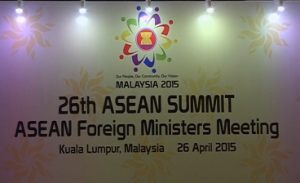THE Philippines has called on the Association of Southeast Asian Nations (ASEAN) Sunday to “assert its leadership, centrality, and solidarity” in order to thwart China’s massive reclamation activities over the disputed West Philippine Sea (South China Sea).
In his intervention during the 26th ASEAN Foreign Ministers meeting in Kuala Lumpur, Malaysia, Foreign Affairs Secretary Albert del Rosario urged his fellow ministers to support the Philippines in opposing China’s unreasonable actions on its way towards controlling majority of the area.
“The threats posed by these massive reclamations are real and cannot be ignored or denied. Their adverse implications are urgent and far-reaching, going beyond the region to encompass the global community,” Del Rosario said.
Del Rosario distributed a ‘disc’ to his fellow ministers, detailing the negative effects of China’s reclamation efforts, especially on the marine environment, while infringing on the rights of other states.
“We believe that if these massive reclamations are allowed to be completed, our northern neighbor will succeed in defining and imposing its unlawful sovereignty claim over more than 85 percent of the South China Sea,” Del Rosario said.
China is poised to consolidate ‘de facto’ control of the entire South China Sea, Del Rosario said, especially since it has stated it will also place defense installations on the reclaimed areas.
It continues to build up structures in the disputed territories despite protestations from Manila, which is pushing for ASEAN to come up with a final Code of Conduct (COC) to address the issue diplomatically.
Given its aggressiveness, however, it is likely that China would finish its reclamation activities before it could even agree to conclude a COC, Del Rosario said—a scenario, which ASEAN must prevent.
“If this is what happens, and which is likely to happen, our northern neighbor’s acts will render the DOC (Declaration of Conduct of Parties in the South China Sea) irrelevant and any COC would have an effect of legitimizing China’s reclamation,” Del Rosario said.
“ASEAN should assert its leadership, centrality, and solidarity. ASEAN must show the world that it has the resolve to act in the common interest,” he said.
Aside from advocating a COC, Manila also resorted to other diplomatic means like bringing the issue to the ASEAN Regional Forum, East Asia Summit, Asia Europe Meeting, and the United Nations for discussion to galvanize the understanding of the international community.
“It may be said that the Philippines has borne more than its share of the heavy burden for ASEAN and the international community on this issue. Notwithstanding all our words of caution, our northern neighbor is clearly and quickly advancing with its massive reclamation,” Del Rosario said.
Del Rosario insisted that the issue affects the entire global community, even as it is unfolding only in the Southeast Asian region, and the ASEAN must do something about it.
“Is it not time for ASEAN to say to our northern neighbor that what it is doing is wrong and that the massive reclamations must be immediately stopped? On this most important issue, is it not time for ASEAN to finally stand up for what is right?” Del Rosario said.
Aside from the Philippines, fellow ASEAN members like Vietnam, Indonesia, Brunei, Thailand, and Malaysia have territorial claims in the South China Sea. (PND report)








